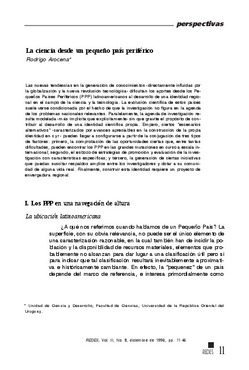La ciencia desde un pequeño país periférico
Science from a small peripheric nation
Abstract
Las nuevas tendencias en la generación de conocimientos -directamente influidas por
la globalización y la nueva revolución tecnológica- dificultan los aportes desde los Pequeños Países Periféricos (PPP) latinoamericanos al desarrollo de una identidad regional en el campo de la ciencia y la tecnología. La evolución científica de estos países suele verse condicionada por el hecho de que la investigación no figura en la agenda de los problemas nacionales relevantes. Paralelamente, la agenda de investigación resulta modelada -más implícita que explícitamente- sin que gravite el propósito de contribuir al desarrollo de una identidad científica propia. Empero, ciertos "escenarios alternativos" -caracterizados por avances apreciables en la construcción de la propia identidad en c y r - pueden llegar a configurarse a partir de la conjugación de tres tipos de factores: primero, la comprobación de las oportunidades ciertas que, entre tantas dificultades, pueden encontrar los PPP en las grandes mutaciones en curso a escala internacional; segundo, el esbozo de estrategias de promoción y evaluación de la investigación con características específicas; y tercero, la generación de ciertas iniciativas que puedan suscitar respaldos amplios entre los investigadores y dotar a su comunidad de alguna vida real. Finalmente, construir esta identidad requiere un proyecto de envergadura regional. New trends in the generation of knowledge -directly influenced by globalization and the new technological revolution- interfere with contributions from small peripheric Latin American countries (SPC) to the development of a regional identity in the field of science and technology. Scientific development of a regional identity is usually conditioned by the fact that research is not an item in the agenda of important domestic problems. Similarly, the research agenda is created -implicitly rather than explicitly- without assigning weight upon the purpose of contributing to the development of a scientific identity of their own.
However, certain "alternative scenarios" -characterized by noticiable advances towards the building of their own identity in S&T- can be created starting from the convergence of three types of factors: first, true opportunities that the PPP may find among the great mutations currently in progress on an international scale; second, an outline of strategies aimed at promoting and assessing specific research projects; and third, the generation of certain initiatives apt to give rise to a wide support among researchers and instill some real life into their communities. Finally, in order to construct this identity, a project of regional scope is required.

